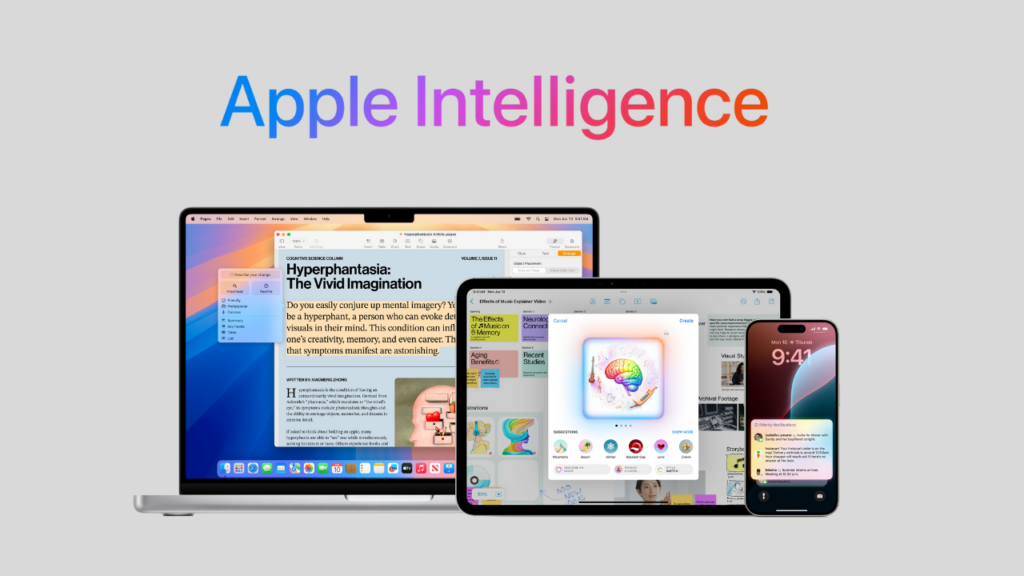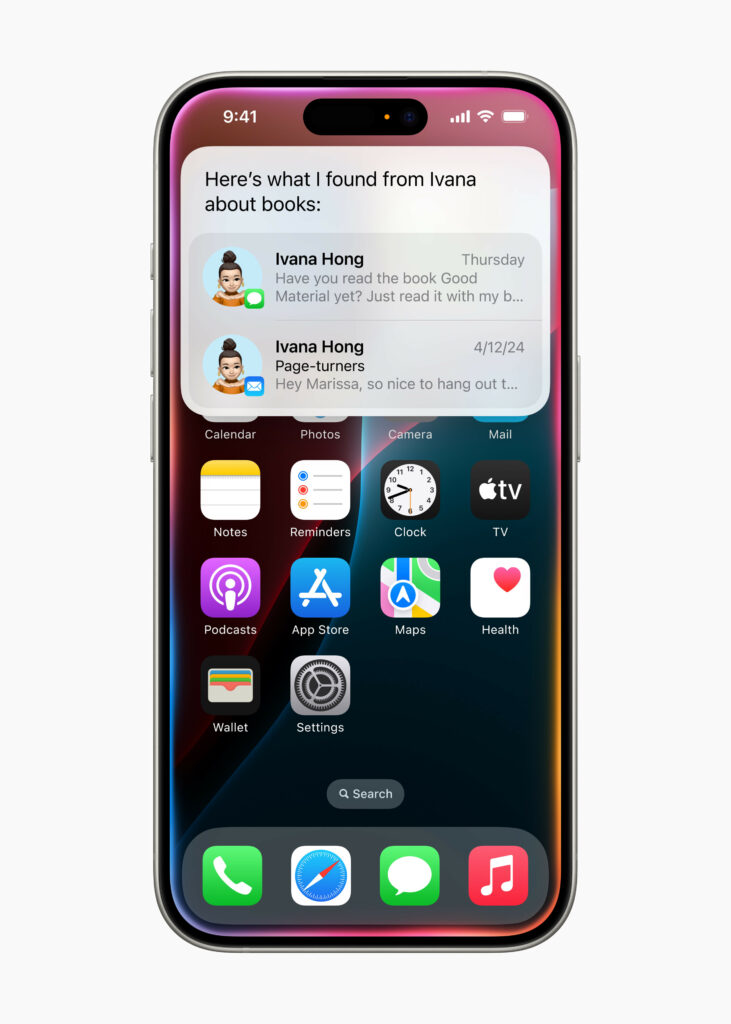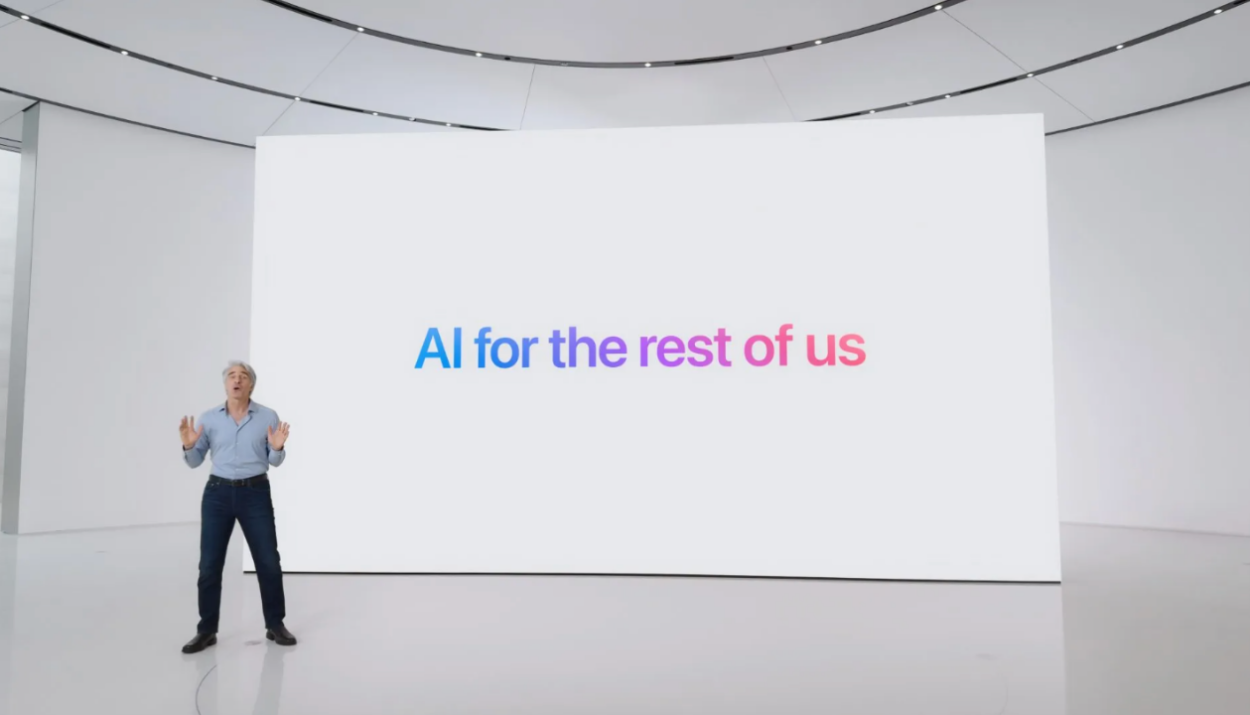During its "it's glowtime" keynote, a flagship event of the new school year, Apple unveiled its new artificial intelligence platform - Apple Intelligence - and its integration into the new iPhone 16. However, this long-awaited launch will not be immediate in Europe, due to regulatory concerns related to the Digital Markets Act.

A keynote under the sign of AI
This September 9, 2024, Apple unveiled its new iPhone 16, marking a major turning point in the company's history: its entering the era of generative AI.
First introduced at WWDC 2024, Apple Intelligence is more than just an app, it's a set of features integrated into the very heart of their operating systems.
Apple Intelligence promises efficiency, fluidity
Apple Intelligence AI leverages the advanced capabilities of generative AI toimprove and boost existing features in the Apple ecosystem:
AI relies on extended language models (LLM), code and image generation but, unlike autonomous AIs like ChatGPT for example, Apple has chosen to integrate its new platform DIRECTLY into its operating systems iOS 18, iPadOS 18 and macOS Sequoia.
And that's the difference.…because this approach allows to create connections between images, texts, videos and music and queries : The promise of a significant change in the way we interact with our devices.
Developed in particular to make Siri more natural and contextual, AI can generate text, edit emails, find photos, analyze images in real time…and of juggle complex, computationally intensive AI tasks in a fluid, intuitive and natural way.


and confidentiality :
This coupling between generative AI models and personal context must be done while respecting our privacy and in complete confidentiality thanks to the functionality Private Cloud Compute associated with a localized treatment directly into the device.
Using generative AI often requires resources and constant access to cloud servers, Apple allows some features to operate directly on the device, ensuring more privacy and better resource management. For more complex tasks, such as generating detailed images, Apple uses sremote servers promising the same level of security as local processing.
I phone 16, AI-boosted features:
The new iPhone 16, presented during the keynote, were designed specifically to take advantage of Apple Intelligence. Among the new features announced, we find:
- Writing Tools : A writing assistant capable of rewriting, correcting and summarizing texts in various applications.
- Visual Intelligence : A feature that allows you to get instant information about the surrounding world using the iPhone camera.
- A “super SIRI” :

“Apple Intelligence marks the beginning of a new era for Siri,” said Craig Federighi, Apple’s vice president of AI. The new AI system makes the assistant “more natural, more contextual, and more personal.”
A true personal assistant, capable of better understanding our requests and adapting to our context, to analyze our habits and navigate between our applications (emails, photos, notes) the new SIRI will work on all applications and will respond to -almost- all our requests.
A gradual launch, but not for Europe
The operating system update incorporating Apple Intelligence will be rolled out gradually, starting with the English version for the United States in October, on compatible devices. International expansion, with support for other languages like French and Chinese, is planned for 2025 but deployment in Europe will have to wait...
Why not Europe?
The reason for this delay, and the disappointment of European consumers, is linked to "regulatory uncertainties", particularly concerning the European Union Digital Markets Act (DMA). Apple is concerned that the DMA's interoperability requirements could compromise the security and privacy of its users' data.
That's to say ?
- Regulatory uncertainties : Apple faces a complex regulatory environment in Europe, particularly with the entry into force of the Digital Markets Act (DMA).
- DMA Interoperability Requirements : This law requires large technology companies, including Apple, to make their systems more open and interoperable with other services. This could force Apple to open up its system further, for example by allowing the installation of applications outside the App Store. This openness, according to Apple, could create security holes and compromise the protection of user data.
Accordingly, Apple prefers to delay the launch of Apple Intelligence in Europe to strike a balance between the openness required by law and the protection of user data and avoid possible sanctions related to non-compliance with the DMA.
In the meantime, European users will still have access to hardware improvements and other new features of the iPhone 16 and 16 Pro, such as advanced photo capabilities and the A18 processor performance. However, the lack of Apple Intelligence could limit the appeal of these new models on the European market.
Conclusion: A major step forward, but challenges to be met
Apple's entry into the era of generative AI with the iPhone 16 is a major step forward for the company, positioning Siri and other Apple Intelligence features as central tools in the user experience.
However, the delay in its launch in Europe underlines the regulatory challenges facing big tech companies in an increasingly complex digital landscape.






